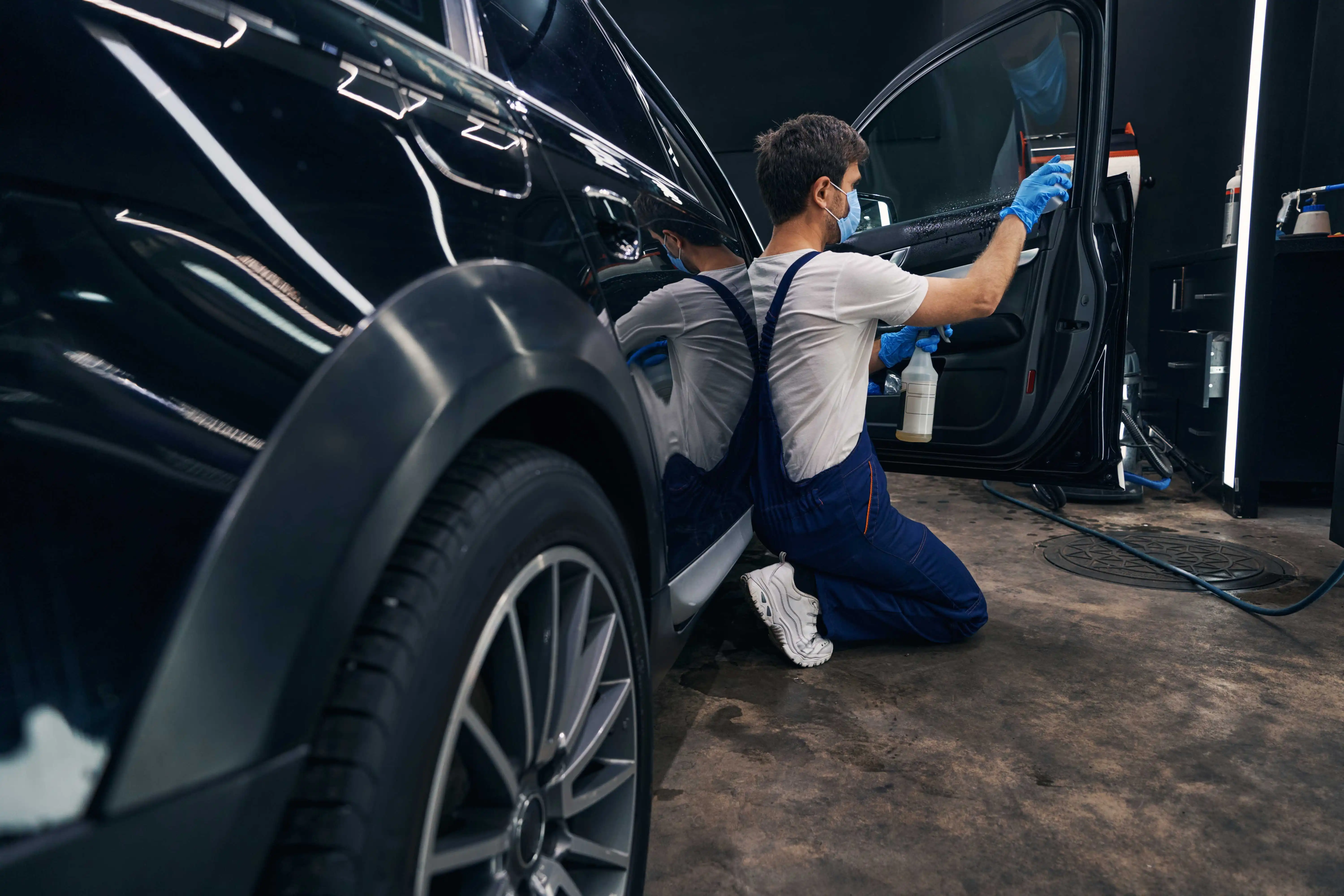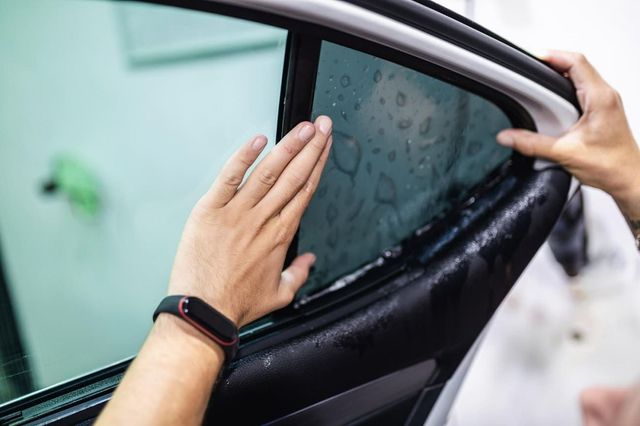Why Car Window Tinting Is Necessary for UV Protection and Interior Conservation
Car window tinting serves an important function in safeguarding both passengers and the car itself from unsafe UV rays. These rays can create skin damage and speed up the degeneration of an automobile's interior. By obstructing a considerable percentage of UV radiation, high-quality tinting not only enhances comfort however additionally maintains the lorry's aesthetic appeal. Recognizing the various advantages of window tinting elevates vital concerns concerning its necessity in today's automotive landscape.
Recognizing UV Rays and Their Impacts on Your Skin
Although lots of people delight in the heat of the sun, they often ignore the dangerous impacts of ultraviolet (UV) rays on their skin. UV rays, mainly classified into UVA and UVB, penetrate the skin and can create numerous damages. UVA rays are connected to skin aging and contribute to the advancement of skin cancers cells, while UVB rays are in charge of sunburn and play a significant duty in triggering skin cancer.Repeated direct exposure to UV radiation can lead to a breakdown of collagen and elastin, leading to premature aging, creases, and sunspots. Additionally, individuals with lighter skin tones are particularly prone to these effects, highlighting the value of safety actions. Routine usage of broad-spectrum sun block and wearing protective apparel can minimize some risks. Nonetheless, auto window tinting offers an additional layer of protection, minimizing UV direct exposure while driving, therefore protecting the skin from the unsafe effects of sun direct exposure throughout traveling.
The Influence of UV Rays on Your Vehicle's Interior
UV rays can significantly damage a vehicle's interior, resulting in fading upholstery and fabrics over time. Furthermore, extended direct exposure can increase the threat of dashboard breaking, compromising the visual and architectural integrity of the car. Additionally, warm build-up from these rays can produce an unpleasant environment for guests and might strain the car's air conditioning system.
Fading Furniture and Fabrics
A considerable issue for vehicle proprietors is the destructive impact of ultraviolet (UV) rays on furniture and textiles. Over time, long term exposure to these rays can bring about considerable fading, modifying the look of seats, rugs, and headliners. This fading not only interferes with the aesthetic value of an automobile but can additionally impact its resale cost. Fabrics, consisting of leather, can come to be fragile and shed their initial texture, making the interior much less comfortable. Particular colors and products are much more susceptible to fading, resulting in irregular wear. To mitigate these effects, car window tinting offers as a reliable barrier, showing hazardous UV rays and maintaining the integrity and vibrancy of interior materials for an extended period.
Control Panel Cracking Risks
Lots of automobile proprietors might not realize the susceptability of their control panels to the ruthless impacts of sunshine. Prolonged direct exposure to ultraviolet (UV) rays can lead to significant damage of dashboard products, specifically plastics and vinyl. In time, these materials can come to be fragile and lose their elasticity, leading to unpleasant splits that not just reduce the aesthetic appeal yet also minimize the total worth of the car. Split dashboards can better intensify indoor damages by permitting dirt and particles to build up in gaps, potentially leading to more comprehensive repairs. By spending in automobile window tinting, vehicle owners can help minimize UV exposure, therefore protecting the stability of their control panel and prolonging the life expectancy of their vehicle's inside.
Warmth Accumulation Consequences
The interior of a vehicle is specifically prone to heat buildup, mostly as a result of the infiltration of sunshine through windows. This warm can lead to a number of damaging effects on the automobile's interior. High temperatures can increase the destruction of materials, creating upholstery to discolor and plastic components to warp or crack. Extended direct exposure to UV rays additionally contributes to the degeneration of leather and vinyl surfaces, resulting in unattractive damages that decreases total vehicle worth. Additionally, too much heat can produce an uncomfortable setting for travelers, making the driving experience much less pleasurable. Applying auto window tinting can substantially alleviate these results by blocking a substantial amount of UV rays and reducing warm buildup, thereby protecting the car's inside for a longer duration.
Just How Vehicle Window Tinting Blocks Harmful UV Rays
Auto window tinting utilizes various UV ray absorption techniques that successfully secure occupants and interiors from unsafe radiation. By incorporating specific materials, these tints not just obstruct UV rays however additionally contribute to considerable warm decrease within the car. This double benefit boosts convenience while maintaining the stability of indoor surfaces.
UV Ray Absorption Techniques
Blocking my latest blog post damaging UV rays is a main function of auto window tinting, accomplished with various absorption methods. Premium tint films are engineered with products that take in and mirror UV radiation properly. These movies often integrate metal oxides, which develop a barrier against UV rays while keeping clarity. In addition, some colors make use of colored polyester layers that take in UV energy without jeopardizing exposure. The efficiency of these techniques differs relying on the film's high quality and thickness, with premium choices offering as much as 99% UV security. This absorption not just safeguards travelers from skin damages however also maintains the automobile's inside from fading and cracking. On the whole, UV ray absorption techniques in automobile window tinting play a necessary role in improving safety and long life.
Heat Decrease Perks

Enhancing Convenience and Lowering Warmth With Window Tinting
Window tinting offers as a sensible solution for improving comfort and minimizing heat within vehicles. By applying a slim film to windows, a substantial amount of solar heat is obstructed from entering the cabin, resulting in a more temperate environment. This reduction in warmth can result in a much more satisfying driving experience, especially throughout warm summertime. In addition, lower interior temperature levels can decrease the dependence on a/c, which not only conserves energy but additionally contributes to improved gas efficiency.Moreover, window tinting decreases glow from the sun, allowing drivers and travelers to focus far better when driving without scrunching up your eyes or being sidetracked. This boosted presence improves total safety and security while driving. Furthermore, a cooler interior translates to much less wear on vehicle parts, contributing to lasting comfort and performance. In general, window tinting is an efficient technique for preserving a pleasurable environment within the lorry while promoting convenience and decreasing heat direct exposure.
The Aesthetic Advantages of Tinted Windows
Colored windows not only boost comfort and lower warmth yet also add considerably to the visual charm of lorries. They give a smooth, sophisticated look, enabling cars and truck owners to reveal their individual style. The subtle darkness of the tint can create a unified look, making an automobile look more sleek and modern.Moreover, different tones of color permit for modification, making it possible for individuals to pick a degree that complements their cars and truck's style. This customization can lead to an extra hostile or sophisticated aesthetic, depending upon individual preference.Additionally, tinted windows can help to minimize glare while driving, thus enhancing the total experience. The boosted privacy that includes colored windows additionally includes an element of intrigue, making the car more visually fascinating. On the whole, the aesthetic advantages of colored windows extend past plain appearance, improving both the look of the vehicle.
Raising Your Car's Resale Worth With Tinting
While several car owners focus on immediate convenience and looks, purchasing window tinting can additionally significantly enhance a car's resale value. Tinted windows not just give a streamlined appearance yet also signal to potential buyers that the vehicle has been properly maintained and safeguarded from sun damage. This protective layer assists preserve the interior, protecting against fading and cracking of furniture and control panel components.Moreover, cars with window tinting usually bring in a larger series of buyers that prioritize convenience and UV security. Boosted personal privacy and decreased glow more add to a much more pleasurable driving experience, making the lorry extra attractive in an affordable market.As car customers increasingly look for automobiles with added attributes, window tinting arises as a valuable financial investment. The possible return on this reasonably low-cost improvement can considerably offset the general expenses when it comes time to sell, making it a smart choice for any kind of car owner.
Choosing the Right Window Color for Your Requirements
Choosing the suitable window color involves recognizing various alternatives offered on the marketplace, each catering to various preferences and requirements. People should take into consideration the level of UV protection called for. Films with higher UV security percents appropriate for those frequently subjected to sunlight.Next, the type of tint ought to be reviewed, including dyed, metalized, and ceramic options. Dyed colors offer personal privacy at a budget-friendly price, while metalized tints provide added warm resistance. Ceramic tints, though pricier, are known for their exceptional UV defense and clarity.Moreover, regional guidelines pertaining to color darkness and reflectivity have to be considered, as these can differ greatly.Ultimately, the choice of window color should line up with personal lifestyle, budget plan, and aesthetic preferences, making sure both capability and design. Consulting with a specialist installer can also help in making a notified choice customized to certain automobile needs.
Frequently Asked Inquiries
How Lengthy Does Vehicle Window Tinting Commonly Last?
Car window tinting typically lasts between 5 to 10 years, relying on variables such as the high quality of the color, installment, and environmental problems. Normal maintenance can aid prolong its lifespan and performance.
Is Window Tinting Legal in All States?
Home window tinting validity differs by state, with particular policies regulating darkness and reflectivity levels - auto tint clinton township. Some states enforce stricter visit homepage rules, while others allow higher freedom. It's vital for car owners to examine local laws before proceeding
Can I Tint My Windows Myself?

What Is the Cost Variety for Specialist Tinting?

Will Window Tinting Affect My Exposure While Driving?
Window tinting can affect visibility while driving, relying on the darkness and kind of tint applied - auto tint clinton township. Generally, lighter tints preserve much better presence, while darker alternatives might lower quality, especially in low-light problems
Comments on “Don’t Delay to Get auto tint clinton township for Your New Vehicle”